The dearth of sign language interpreters across health facilities in Kano is one that has limited quality healthcare service delivery for hearing-impaired People with Disabilities (PWDs). Stephen Enoch investigates the lack of these interpreters amidst government’s huge budgetary allocation.
The trend analysis of the allocation and releases of the Kano state health budget from 2018-2022 shows that the government allocated over N161 bn to the health sector.
In 2018 the health sector budget percentage was 13.07%, in 2019 it increased by 2.15, in 2020 it dropped by 0.06%, in 2021 it increased again to 2.10% and dropped by 1.90% in 2022.
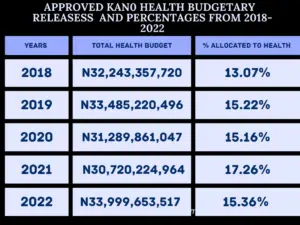
Death of one, the beginning of health difficulties for many
A few months after his demise, accessing healthcare for the PWDs can be likened to walking on pins and needles, barefooted.
Tasiu who spoke through a hired interpreter said: “The memory of how I suffered because of the lack of an interpreter during the delivery of Hauwa (Her baby) still makes me bitter to date,” she said, as she pitifully took a glance at 7-month-old Hauwa tightly strapped at her back.
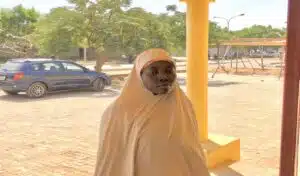
The D-day had arrived and the mother of six was in labor, ready for Hauwa’s birth but the delivery came with a little complication. The doctor and other health workers gave her several instructions but she couldn’t understand however hard she tried and to that end, couldn’t act accordingly.
“It was frustrating because I was in pain and the doctors had the solutions and were giving instructions but I was just looking but couldn’t comprehend anything.
“I was helpless and hurt because even when I tried to speak with the health officials using sign language, no one understood because there was no person that could assist with interpreting.
“I don’t like to remember that day because it was one of the worst deliveries I have ever had,” she narrated.
How Hajara gave birth to her child remains a miracle, according to her. She said the atmosphere felt like she was in another place entirely, at the peak of the delivery but thanked God for the safe delivery of her child.
“I don’t pray for any woman to experience what I passed through because honestly, I really suffered. My husband and I cannot afford a private hospital because we are poor. I thank Allah for seeing me through and honestly, the demise of Shafiu is really affecting many hearing-impaired PWDs that access care here,” she said.
Accessing healthcare through gambled communication
Unfortunately, her explanation does not often end up being understood by most times.
Narrating her ordeal to this reporter through another hired interpreter, the mother of five vividly recollects a period when she was overwhelmed with a serious fever to the point that the symptoms couldn’t be contained at home and had no other option than to visit Sumaila General Hospital after she vomited more than five times before noon.
The scorching sun didn’t help matters as she used the last energy left in her to scout for a motorcycle that took her to the hospital.
“On arrival at the hospital, I met a doctor. My communication couldn’t be understood as usual and I was too weak to continue with the gesticulation, so I was referred to the laboratory for a test where it was discovered that I was malaria positive.
“I was treated and given drugs which made me a bit relieved. I went home not knowing that the worst was yet to happen. There was an underlining illness that wasn’t treated.
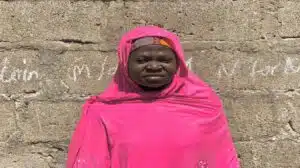
“The second treatment in the hospital didn’t stop me from vomiting although this time, it wasn’t as intense as the previous and after ten days of the lingering vomiting and fever, I just had to resort to taking local herbs which gradually enabled my recovery. It was a life-threatening experience and I thank Allah for saving my life.” She said.
Reality check
The investigation was carried out by Auwalu Salisu, a hired hearing-impaired resident of Hotoron Arewa in the Nassarawa local government area of Kano state.
It was a few minutes past 5 pm when Salisu arrived at Muhammadu Abdullahi Wase Teaching Hospital (aka Nassarawa Hospital) in Nassarawa LGA under the close of the watch reporter.
Salisu’s destination was the outpatient department (OPD).
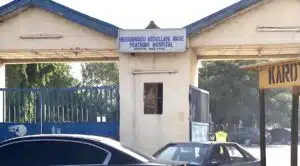
At the male medical ward, a health worker led him to the male surgical ward and was subsequently directed to another department in the hospital by another staff afterwards.
After waiting for his turn, Salisu met the health worker on duty and tried explaining that he felt feverish but on realizing that he is hearing impaired, the health worker immediately referred him to another office.
Following Salisu’s persistence, a health worker agreed to attend to him.
Salisu’s silence depicted that he could not hear. The officer then directed him behind the counter and flashed a medical light in his eye and inside his mouth. Afterwards, he tried to ask Salisu how he felt by gesticulating, and then, in turn, Salisu used sign language to communicate, but they were both left confused.
Salisu watched as others were attended to but he was left standing aside. After he got tired of waiting, he left the hospital. No one called him back or try to attend to him.
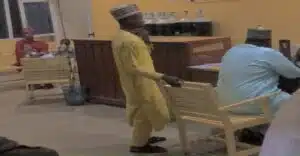
Article 25 of the UN Convention on the Rights of Persons with Disabilities (CRPD) says “state parties recognize that persons with disabilities have the right to the enjoyment of the highest attainable standard of health without discrimination on the basis of disability.
States Parties shall take all appropriate measures to ensure access for persons with disabilities to health services that are gender-sensitive, including health-related rehabilitation” but the case was different when Salisu visited Nassarawa Teaching Hospital in Kano.
Doctor’s communication with hearing-impaired patients
Dr Abdullahi Suleiman, Chairman of the Kano Chapter of the Nigerian Medical Association (NMA) underscores the importance of sign languages across health facilities as health is a critical aspect of human life.
He said: “Doctor’s communication with hearing-impaired PWDs in a situation when there is no interpreter can be very challenging.
“Doctor-Patient interaction depends on the exchange of information between them and the lack of understanding of the hearing impaired will prevent the doctor from collecting the right information from the patient, thereby not knowing the symptoms, the extent of the illness, and possible treatment options, and will affect the quality of care they receive.
“I have attended to patients that are hearing impaired and communication with them is quite challenging and conversing with literate hearing-impaired PWDs is easier through writing notes but is really time-consuming, considering a situation when there are a handful of patients to attend to.”
Dr Suleiman agreed the burden on Doctors will be greatly reduced if sign language interpreters are adequately engaged in health facilities across the state because doctors do not have any special training for communicating with the hearing impaired.
The Office of the Secretary-General to the Kano State government (SSG), Expanding Social Protection for Inclusive Development Project (ESPID), and Partnership to Engage, Reform and Learn (PERL) a program funded by the Foreign, Commonwealth & Development Office amongst others, have been overtime, working collaboratively to ensure that the government signs the 2021 Kano state amendment bill into law as well as the 2018 PWD discrimination prohibition act.
Rabiu Abdullahi, the director, of development partners at the office of the SSG said through civic education and advocacy to the government by non-governmental organizations, the Kano state ministry of planning and budget has accepted and included the budget of the commission for the PWDs in the 2023 budget which will ensure commission has its own budget line.
“While we cannot assure that interpreters will be adequately provided across all health facilities in the state because we have so many health centers in Kano but the establishment of the commission and implementation of the law will significantly aid access to health by the hearing impaired in the state.
High-level advocacy, collaboration, the way forward
He said there is a restructuring in the ministry of health which he believes will capture the hearing impaired as the Disability bill has been signed into law by the government, pointing out that high-level advocacy to the ministry of health on the challenges of hearing impaired PWDs at health facilities due to the lack of interpreters will aid the government responds accordingly.
“The issue of disability is not under the ministry of health but the ministry of women affairs so there is a need for both ministries to collaborate so as to see that the needed personnel are employed to aid seamless access to healthcare delivery by the hearing impaired PWDs,” noted.


